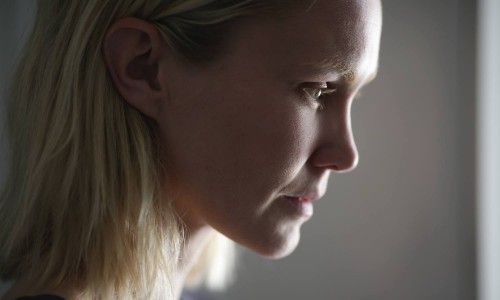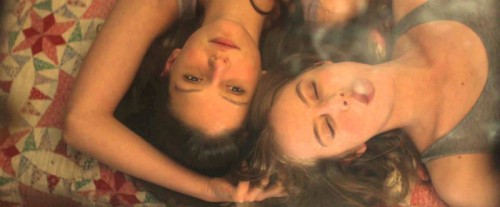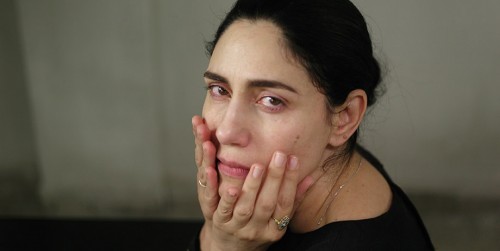AFI Fest 2014: Blind; Breathe; and Gett, the Trial of Viviane Amsalem
For those invested in the visual arts, the thought of losing one’s sight is an unimaginable horror. In addition to the deprivation of one of the sense we rely upon most to simply get around day to day, an entire, key way of interpreting that world would also be lost. There is, thus, an undercurrent of horror in Eskil Vogt’s directorial debut, Blind, which examines a few weeks in the life and imagination of a recently-blinded woman. Vogt made his mark on the international circuit by writing co-writing Joachim Trier’s first two features, Reprise and Oslo, August 31, but his own directorial debut could not be further removed from those toughly-wrought naturalistic dramas.
Since her diagnosis, Ingrid (Ellen Dorrit Petersen, mischievous and guarded) hasn’t really left her apartment. Her husband, Morten (Henrik Rafaelsen), reluctantly goes to work each morning, hoping when he returns that she’ll have a more exciting answer when he asks what she did that day. She gradually retreats into her own fantasies and fears, projecting her husband’s affair with a woman she can control, and imagining the life of a lonely middle-aged man who spies on women undressing, his self-imposed isolation mirroring Ingrid’s. Despite sensory deprivation, Vogt suggests, the artistic imagination has no rest, and his gorgeously uncomfortable rendering of Ingrid’s is a study in doing quite a lot with very few resources. He rarely ventures outside of a couple apartments, but within them, he creates boundless worlds, richly imagined and delicately textured. The bareness of Ingrid and Morten’s own apartment – into which they’ve recently moved and, due to Ingrid’s deteriorating eyesight, have only sparsely furnished – contrasts beautifully with the cramped, messy quarters of the pervert’s and the lovingly-arranged decor of Morten’s imagined lover.
Vogt and editor Jens Christian Fodstad do marvelous work weaving in and out of real and imagined worlds, so that, even when the essential thrust of the story is made explicit early on, we’re never quite sure into which we’ve stepped, or if it even matters. His screenplay lays it all on a bit thick by the finale, but it nevertheless a very well-constructed portrait of self-imprisonment and the difficulty of developing and nurturing intimate relationships.
As one might imagine, Blind wasn’t the only entry in an international film festival dealing with the terror of loneliness. Breathe, Melanie Laurent’s second feature, takes a more external, but no less incisive, view of how small slights can create massive barriers between people. Charlie (Josephine Japy) is what any logline would describe to be an “average” teenage girl. She has her group of friends, gets good grades in school, and has much to celebrate and anticipate as she nears the end of high school, even as her parents are nearing divorce, an event she unsuccessfully attempts to position herself apart from. Enter Sarah (Lou De Laage), a worldly, overconfident new student who rushes into Charlie’s life, quickly becoming her new best friend and, practically, roommate.
The latter is due to a situation at home that Sarah paints as unstable, but little more than an annoyance. In the meantime, Sarah and Charlie take to one another for differing, but complementary, purposes. Charlie is relatively inexperienced – sexually, emotionally, culturally – and being around Sarah gives her the air of sophistication that the latter convincingly emits. Sarah, meanwhile, is granted a mentee of sorts, someone she can feel superior to while satisfying the needs of a close, personal relationship. Once Sarah accompanies Charlie and her mother to a seaside vacation, however, small tensions erupt, as neither is able to come out and say what the other means to them, perhaps for fear of seeming too dependent, or just for the common teenage sense of pride in needing to seem above natural jealousies.
Sarah is the more aggressive in this arena, pursuing other men in the resort area who have little active interest in her, but Charlie is equally complicit, her indifference to Sarah’s desires a series of barely-perceptible pinpricks that gradually work open some deep wounds. Unable to properly address their growing rift, Charlie clings to the increasingly-few moments in which their relationship reminds her of what it once was, and what she wants, before investigating for herself Sarah’s hidden home life, revealed (in a single masterful tracking shot) as a great deal more personal and volatile than she let on.
The quick escalation in Sarah’s retaliation, while it certainly has its basis in some of the more outrageous accounts you read online, might come off a little heightened and unbelievable if not for sheer emotional potency of it all. Adolescence is a daily struggle with banal circumstances that feel like the world is crashing down around you, and Laurent (adapting, alongside Julien Lambroschini, a novel by Anne-Sophie Brasme) isn’t afraid to literalize that emotion, giving her heightened circumstances credence by the acuteness of her smaller observations. As Charlie listens in on Sarah’s home life, a group of rowdy young men walk by. Charlie quickly tears herself away from her eavesdropping, avoiding the men who might loudly come onto her and draw Sarah’s attention. Where Vogt’s world was built from the outside in, Laurent constructs hers as a series of outside forces assaulting Charlie, without letting her become a mere victim. One of the sadder facts of life is that we will all deeply hurt somebody by complete accident.
A victimized woman battling outer oppression is, however, very much the subject of brother-sister team Ronit and Schlomi Elkabetz’s Gett, the Trial of Viviane Amsalem. For those not up on their Jewish Law (or who skipped A Serious Man), a get is a divorce document that a man presents a woman so that the laws of adultery no longer apply to her. The film is the third in a series featuring the titular character and her husband, the prior two showing them on the path to divorce court in Israel. I’ve not seen them, though, so I can personally attest that there’s no “catching up” to do here if you’re not feeling up to it. What I will say is that it’s a sharply funny, almost satirical look at the ridiculous extent one woman must go to live with some semblance of basic freedom.
Ronit Elkabetz pulls triple-duty, not only co-writing and -directing the film, but also playing the lead role. The entire film takes place in the courthouse, and there she sits, hearing after hearing, for five years as her husband Elisha (Simon Abkarian) puts up every wall he can imagine (and, as a man, he is afforded quite a few) to stubbornly insist they remain together, not because he’s any happier with the arrangement than she, but simply because to divorce is unimaginable; to allow her into the arms of another man even more so. Elkabetz plays to the frustration of the situation, in her best moments simply aghast at how little respect she is afforded. The prevailing sentiment of the court (and all her friends and family, it should be noted) is that if he doesn’t beat or cheat on her, what does she have to complain about, really?
It all makes for fairly compelling cinema, as courtroom procedurals tend to, forcing characters to dig deep within themselves to uncover the truth, however painful. But what starts out as a small issue grows into titanic proportions, as it becomes clear the Elkabetzes are happy to cater to the audience that naturally aligns with Viviane, complimenting them on an open-minded worldview they all share. This is not to say they’re wrong for holding that viewpoint, but that a more daring film would give more credence to the traditional Israeli societal establishment than simply hold it up as an object of mockery. There is, I will note, more than a small possibility this approach plays better in their home nation, and that it is simply my privilege to feel this stance so obvious.
As a final note, all three of these films featured female protagonists, and exactly half of the directors who made them were women. I didn’t group them together based on this – if I did, I’d have to include three other films as well – but I just wanted to make note of how pleased I was that so many were included at AFI Fest 2014 presented by Audi.
































